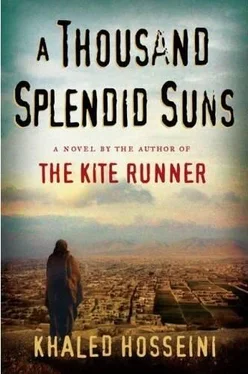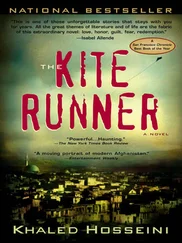It was with the sun's westward crawl that Mariam's anxiety really ratcheted up. Her teeth rattled when she thought of the night, the time when Rasheed might at last decide to do to her what husbands did to their wives. She lay in bed, wracked with nerves, as he ate alone downstairs.
He always stopped by her room and poked his head in.
"You can't be sleeping already. It's only seven. Are you awake? Answer me. Come, now."
He pressed on until, from the dark, Mariam said, "I'm here."
He slid down and sat in her doorway. From her bed, she could see his large-framed body, his long legs, the smoke swirling around his hook-nosed profile, the amber tip of his cigarette brightening and dimming.
He told her about his day. A pair of loafers he had custom-made for the deputy foreign minister – who, Rasheed said, bought shoes only from him. An order for sandals from a Polish diplomat and his wife. He told her of the superstitions people had about shoes: that putting them on a bed invited death into the family, that a quarrel would follow if one put on the left shoe first.
"Unless it was done unintentionally on a Friday," he said. "And did you know it's supposed to be a bad omen to tie shoes together and hang them from a nail?"
Rasheed himself believed none of this. In his opinion, superstitions were largely a female preoccupation.
He passed on to her things he had heard on the streets, like how the American president Richard Nixon had resigned over a scandal.
Mariam, who had never heard of Nixon, or the scandal that had forced him to resign, did not say anything back. She waited anxiously for Rasheed to finish talking, to crush his cigarette, and take his leave. Only when she'd heard him cross the hallway, heard his door open and close, only then would the metal fist gripping her belly let go.
Then one night he crushed his cigarette and instead of saying good night leaned against the doorway.
"Are you ever going to unpack that thing?" he said, motioning with his head toward her suitcase. He crossed his arms. "I figured you might need some time. But this is absurd. A week's gone and… Well, then, as of tomorrow morning I expect you to start behaving like a wife. Fahmidi? Is that understood?"
Mariam's teeth began to chatter.
"I need an answer."
"Yes."
"Good," he said. "What did you think? That this is a hotel? That I'm some kind of hotelkeeper? Well, it… Oh. Oh. La illah u ilillah. What did I say about the crying? Mariam. What did I say to you about the crying?"
THE NEXT MORNING, after Rasheed left for work, Mariam unpacked her clothes and put them in the dresser. She drew a pail of water from the well and, with a rag, washed the windows of her room and the windows to the living room downstairs. She swept the floors, beat the cobwebs fluttering in the corners of the ceiling. She opened the windows to air the house.
She set three cups of lentils to soak in a pot, found a knife and cut some carrots and a pair of potatoes, left them too to soak. She searched for flour, found it in the back of one of the cabinets behind a row of dirty spice jars, and made fresh dough, kneading it the way Nana had shown her, pushing the dough with the heel of her hand, folding the outer edge, turning it, and pushing it away again. Once she had floured the dough, she wrapped it in a moist cloth, put on a hijab, and set out for the communal tandoor.
Rasheed had told her where it was, down the street, a left then a quick right, but all Mariam had to do was follow the flock of women and children who were headed the same way. The children Mariam saw, chasing after their mothers or running ahead of them, wore shirts patched and patched again. They wore trousers that looked too big or too small, sandals with ragged straps that flapped back and forth. They rolled discarded old bicycle tires with sticks.
Their mothers walked in groups of three or four, some in burqas, others not. Mariam could hear their high-pitched chatter, their spiraling laughs. As she walked with her head down, she caught bits of their banter, which seemingly always had to do with sick children or lazy, ungrateful husbands.
As if the meals cook themselves.
Wallah o billah, never a moment's rest!
And he says to me, I swear it, it's true, he actually says to me…
This endless conversation, the tone plaintive but oddly cheerful, flew around and around in a circle. On it went, down the street, around the corner, in line at the tandoor. Husbands who gambled. Husbands who doted on their mothers and wouldn't spend a rupiah on them, the wives. Mariam wondered how so many women could suffer the same miserable luck, to have married, all of them, such dreadful men. Or was this a wifely game that she did not know about, a daily ritual, like soaking rice or making dough? Would they expect her soon to join in?
In the tandoor line, Mariam caught sideways glances shot at her, heard whispers. Her hands began to sweat. She imagined they all knew that she'd been born a harami, a source of shame to her father and his family. They all knew that she'd betrayed her mother and disgraced herself.
With a corner of her hijab, she dabbed at the moisture above her upper lip and tried to gather her nerves.
For a few minutes, everything went well.
Then someone tapped her on the shoulder. Mariam turned around and found a light-skinned, plump woman wearing a hijab, like her. She had short, wiry black hair and a good-humored, almost perfectly round face. Her lips were much fuller than Mariam's, the lower one slightly droopy, as though dragged down by the big, dark mole just below the lip line. She had big greenish eyes that shone at Mariam with an inviting glint.
"You're Rasheed jan's new wife, aren't you?" the woman said, smiling widely. "The one from Herat. You're so young! Mariam jan, isn't it? My name is Fariba. I live on your street, five houses to your left, the one with the green door. This is my son Noor."
The boy at her side had a smooth, happy face and wiry hair like his mother's. There was a patch of black hairs on the lobe of his left ear. His eyes had a mischievous, reckless light in them. He raised his hand. "Salaam, Khala jan."
"Noor is ten. I have an older boy too, Ahmad."
"He's thirteen," Noor said.
"Thirteen going on forty." The woman Fariba laughed. "My husband's name is Hakim," she said. "He's a teacher here in Deh-Mazang. You should come by sometime, we'll have a cup-"
And then suddenly, as if emboldened, the other women pushed past Fariba and swarmed Mariam, forming a circle around her with alarming speed
"So you're Rasheed jan's young bride-"
"How do you like Kabul?"
"I've been to Herat. I have a cousin there"
"Do you want a boy or a girl first?"
"The minarets! Oh, what beauty! What a gorgeous city!"
"Boy is better, Mariam jan, they carry the family name-"
"Bah! Boys get married and run off. Girls stay behind and take care of you when you're old"
"We heard you were coming."
"Have twins. One of each! Then everyone's happy."
Mariam backed away. She was hyperventilating. Her ears buzzed, her pulse fluttered, her eyes darted from one face to another. She backed away again, but there was nowhere to go to – she was in the center of a circle. She spotted Fariba, who was frowning, who saw that she was in distress.
"Let her be!" Fariba was saying. "Move aside, let her be! You're frightening her!"
Mariam clutched the dough close to her chest and pushed through the crowd around her.
"Where are you going, hamshira?”
She pushed until somehow she was in the clear and then she ran up the street. It wasn't until she'd reached the intersection that she realized she'd run the wrong way. She turned around and ran back in the other direction, head down, tripping once and scraping her knee badly, then up again and running, bolting past the women.
Читать дальше












